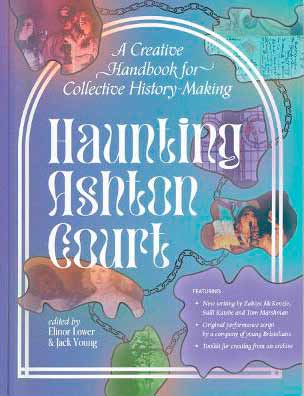“Mishmash” is the term the authors of this book use to describe their various working methods. It is also an accurate description of the book itself which contains not only the performance script of the Haunting Ashton Court production but also its sources and inspiration, some creative writing, a toolkit for similar productions and a wise afterword.
Plus – totally new to me – QR code sections that enable a reader with a smart phone to see and hear parts of the live production. I confess that there were times when I found it difficult to follow the thread of what the young actors were intending to communicate and the drama production felt to me more like work in progress.
But much of this book I found inspirational. It records “how the sticky webs of empire and colonialism sprawl across the planet”, points out that in the Archives “there is next-to-no sign of the majority of lives animating Ashton Court and its insidious transatlantic footprint”, savages the writings of local historian Anton Bantock and records the way in which local miners in Bedminster and plantation workers in Jamaica were linked by exploitation, leading to the “unimaginable stolen wealth” of the exploiters.
The toolkit section of the book contains an abundance of innovative and exciting ideas; it puts considerable stress on developing ideas collectively, with improvisation in which everyone in the group is “accepting of and open to the ideas being presented by everyone else.” I can see that this is an important way of enabling young actors to feel involved in a production but was reminded of a production of Pirandello’s play Tonight We Improvise that I once saw. At the end of the first act, the actors rise in revolt against their play’s writer/director and decide they are better off without him. But at the end of second act, they reluctantly decide they need him after all, to ensure they get the message over lucidly and effectively.
Perhaps though that is the perspective of one of those who, on page 90, are referred to as “White old men from the ‘West’” – and was once a writer/director himself.
